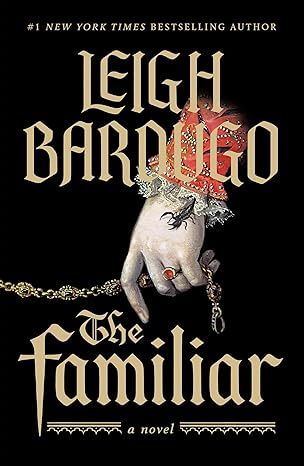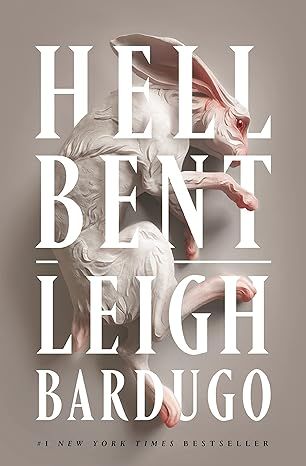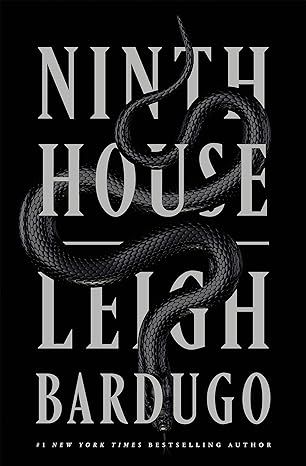The Familiar: A Novel
4.3
-
4,733 ratings
#1 NATIONAL BESTSELLER * #1 INDIE BESTSELLER * NEW YORK TIMES BESTSELLER
“An immersive, sensual experience.” —The New York Times
"Essential." —The Washington Post
From the #1 New York Times bestselling author Leigh Bardugo comes a spellbinding novel set in the Spanish Golden Age.
In a shabby house, on a shabby street, in the new capital of Madrid, Luzia Cotado uses scraps of magic to get through her days of endless toil as a scullion. But when her scheming mistress discovers the lump of a servant cowering in the kitchen is actually hiding a talent for little miracles, she demands Luzia use those gifts to improve the family's social position.
What begins as simple amusement for the nobility takes a perilous turn when Luzia garners the notice of Antonio Pérez, the disgraced secretary to Spain's king. Still reeling from the defeat of his armada, the king is desperate for any advantage in the war against England's heretic queen—and Pérez will stop at nothing to regain the king's favor.
Determined to seize this one chance to better her fortunes, Luzia plunges into a world of seers and alchemists, holy men and hucksters, where the lines between magic, science, and fraud are never certain. But as her notoriety grows, so does the danger that her Jewish blood will doom her to the Inquisition's wrath. She will have to use every bit of her wit and will to survive—even if that means enlisting the help of Guillén Santángel, an embittered immortal familiar whose own secrets could prove deadly for them both.
Kindle
$14.99
Available instantly
Audiobook
$0.00
with membership trial
Hardcover
$17.98
Paperback
$19.99
Ships from
Amazon.com
Payment
Secure transaction
ISBN-10
1250884276
ISBN-13
978-1250884275
Print length
400 pages
Language
English
Publisher
Flatiron Books
Publication date
April 07, 2025
Dimensions
5.38 x 1 x 8.25 inches
Item weight
1 pounds
Popular Highlights in this book
Language creates possibility. Sometimes by being used. Sometimes by being kept secret.
Highlighted by 734 Kindle readers
Better to live in fear than in grinding discontent. Better to dare this new path than continue her slow, grim march down the road that had been chosen for her. At least the scenery would be different.
Highlighted by 483 Kindle readers
Later Luzia would understand that when it came to anything worth having, there was no end to more.
Highlighted by 426 Kindle readers
Product details
ASIN :
B0C2MZXDBV
File size :
1882 KB
Text-to-speech :
Enabled
Screen reader :
Supported
Enhanced typesetting :
Enabled
X-Ray :
Enabled
Word wise :
Enabled
Editorial Reviews
"The sharp realism mixes with a genuine feeling of enchantment to create a top tier historical fantasy." ―Publishers Weekly (starred review)
"The Familiar highlights all of the things that make Bardugo so well loved: a romance with maddening chemistry, an artfully built world, side characters with their own deep backstories, and a plot full of dark twists and spiderweb connections." ―Booklist (starred review)
“Lush, gorgeous, precise language and propulsive plotting sweep readers into a story as intelligent as it is atmospheric.” ―Kirkus (starred review)
"Bardugo masterfully weaves magical realism with historical fiction and romance, which makes this book impossible to put down." ―Library Journal (starred review)
“A richly imagined, intricate tale... I loved every word of this novel, and it’s a must-read for those who are seeking a little magic in their lives.” ―Deborah Harkness, #1 bestselling author of A Discovery of Witches
"Riveting... Leigh Bardugo's characters are so three-dimensional you want to reach through the page." ―Diana Gabaldon, #1 New York Times bestselling author of Outlander
"A wonderful, transporting ride through a moment in history, where you can see the height of Spanish power but also sense the rot underneath. I really enjoyed it, it definitely made me think, and, of course, it's deeply romantic." ―Katherine Arden, author of The Warm Hands of Ghosts
Sample
Chapter 1
If the bread hadn’t burned, this would be a very different story. If the cook’s son hadn’t come home late the night before, if the cook hadn’t known he was hanging around that lady playwright, if she hadn’t lain awake fretting for his immortal soul and weeping over the future fates of possible grandchildren, if she hadn’t been so tired and distracted, then the bread would not have burned and the calamities that followed might have belonged to some other house than Casa Ordoño, on some other street than Calle de Dos Santos.
If, on that morning, Don Marius had bent to kiss his wife’s cheek before he went about the day’s business, this would be a happier story. If he had called her my darling, my dove, my beauty, if he had noted the blue lapis in her ears, or the flowers she had placed in the hall, if Don Marius hadn’t ignored his wife so that he could ride out to Hernán Saravia’s stables to look over horses he could never afford to buy, maybe Doña Valentina wouldn’t have bothered going down to the kitchen, and all of the tragedy that was to follow would have poured out into the gutter and rolled down to the sea instead. Then no one would have had to suffer anything but a bowlful of melancholy clams.
Doña Valentina had been raised by two cold, distracted parents who felt little toward her beyond a vague sense of disappointment in her tepid beauty and the unlikelihood that she would make a good match. She hadn’t. Don Marius Ordoño possessed a dwindling fortune, lands crowded with olive trees that failed to fruit, and a well-proportioned but unassuming house on one of the better streets in Madrid. He was the best that Valentina, with her unremarkable dowry and less remarkable face, could hope for. As for Marius, he’d been married once before to a redheaded heiress, who had stepped in front of a carriage and been trampled to death only days after their wedding, leaving him without children or a single coin of her parents’ money.
On Valentina’s wedding day, she wore a veil of golden lace and ivory combs in her hair. Don Marius, gazing at their reflection in the watery mirror propped against the wall in the front room of his home, had been surprised by the jolt of lust that overtook him, inspired perhaps by his bride’s hopeful eyes, or the sight of himself in his wedding clothes. But it’s more likely he was moved by the brandied cherries he’d been eating all morning, tucking them into his cheeks and chewing them slowly rather than making conversation with his new father-in-law. That night he fell upon his bride in a frenzy of passion, whispering poetry into her ears, but he had managed only a few awkward thrusts before vertigo overcame him and he vomited the plump half-chewed bodies of brandied cherries all over the nuptial linen that Valentina had embroidered with her own hands over a period of many weeks.
In the months and years to come, Valentina would look back almost wistfully on that night, as Marius’s cherry-fueled ardor was the only sign of passion or even interest in her that he had ever shown. And while it was true that she’d simply gone from one loveless home to another, that didn’t mean she didn’t feel the absence of love. Doña Valentina had no acceptable name for the longing she felt, and no idea how to soothe it, so she filled her days irritating their few servants with constant correction and existing in a state of relentless dissatisfaction.
That was why she went down to the kitchen that morning—not once, but twice.
The cook had grown increasingly erratic as her son’s obsession with the playwright Quiteria Escárcega became known, so Doña Valentina made sure to check on her every morning. That day, as she came down the stairs, feeling the heat rise around her, she was greeted by the unmistakable odor of burning bread and nearly swooned with the pleasure of something tangible to complain about.
But the cook wasn’t there.
Valentina intended to remain, sweating in the heat from the fireplace, her anger rising to a furious boil, refining a long rant against wastefulness, negligence, and the cook’s general character. But a knock at the door echoed above, and Valentina knew it might be someone who wished to speak to her husband about his olives. It might even be an invitation—unlikely, but just the hope was enough to make her move. There was no one else to answer the door at Casa Ordoño. Her husband had made it clear they could afford no additional servants and that she was lucky to have a cook and a scullion to help her around the house. There was nothing to do but set aside her rage and stomp back up the steps, dabbing at her moist face with her sleeve.
When she marched down the stairs again, a letter from her father stuffed unread into her sleeve, she heard the cook nattering about something to the squat lump of a scullion girl who smelled of damp and who was always stumbling about the house with her eyes on her graceless feet.
“Águeda,” Valentina said as she burst into the kitchen, voice vibrating with the righteousness of a good scold, “can you tell me why you see fit to waste my husband’s fortune and my time by once again burning the bread?”
The cook looked at her dully, sullen eyes red from crying over her foolish son, then turned her gaze to the table at the center of the kitchen, where the bread waited in its black pan.
Even before Valentina looked, she felt her body flush, the likelihood of her own humiliation coming on like a sudden storm. The bread sat, a little golden cushion in its iron bed, its top high, glossy, and golden brown, perfectly risen, perfectly baked. Doña Valentina wanted to examine the bread, poke it with her finger, and declare it a liar. She had seen that same bread only minutes ago, blackened and ruined, its dome of crust collapsed by heat. And she knew, she knew it was not another loaf drawn from the fire to replace the first because she recognized that iron pan with its slightly dented corner.
It wasn’t possible. She had been gone only a few minutes. They’re playing a trick, Valentina thought, the stupid cook and the stupid kitchen girl are trying to goad me, to get a reaction and make me look a fool. She would not give them the satisfaction.
“You have burned the bread before,” she said lightly, “and I have no doubt you will do it again. See to it that our midday meal is not late to table.”
“Will Don Marius be home to dine, señora?”
Valentina considered slapping the cook’s smug face. “I don’t believe so,” she said brightly. “But I will have two friends joining me. What are you preparing?”
“The pork, señora. Just as you asked.”
“No,” Valentina corrected. “It was the quail I requested. The pork is for tomorrow, of course.”
Again the cook stared at her, her eyes hard as stubs of coal. “Of course, señora.”
Valentina knew very well that she had requested the pork. She had planned the meals for the household a week prior as she always did. But let the cook remember that this was her home and she was never to be the butt of the joke.
After Doña Valentina left, Luzia plucked the quail and listened to the cook mutter angrily as she set aside the stewed pork, pots and pans clattering. She was making a fuss, but the pork could be kept for tomorrow with little trouble. It was Doña Valentina’s manner that had further soured Águeda’s miserable mood. Luzia was almost grateful. An angry Águeda was better company than a moping Águeda.
Still Doña Valentina’s unhappiness bled into everything, and each time she came to the kitchen Luzia worried her bitterness might turn the milk or cause the vegetables to spoil. Her aunt had warned her long ago that some people brought misery with them like weather, and she’d told the story of Marta de San Carlos, who, jilted by her lover, had gone for a walk along the leafy paths by the Alcázar and wept so long and so hard the birds had joined in. For years after, anyone who entered the gardens and heard the birds sing was overcome by sadness. Or so Luzia’s aunt said.
When Luzia had seen the burnt bread, she hadn’t thought much about passing her hand over it and singing the words her aunt had taught her, “Aboltar kazal, aboltar mazal.” A change of scene, a change of fortune. She sang them very softly. They were not quite Spanish, just as Luzia was not quite Spanish. But Doña Valentina would never have her in this house, even in the dark, hot, windowless kitchen, if she detected a whiff of Jew.
Luzia knew that she should be careful, but it was difficult not to do something the easy way when everything else was so hard. She slept every night on the cellar floor, on a roll of rags she’d sewn together, a sack of flour for her pillow. She woke before dawn and went out into the cold alley to relieve herself, then returned and stoked the fire before walking to the Plaza del Arrabal to fetch water from the fountain, where she saw other scullions and washerwomen and wives, said her good mornings, then filled her buckets and balanced them on her shoulders to make the trip back to Calle de Dos Santos. She set the water to boil, picked the bugs out of the millet, and began the day’s bread if Águeda hadn’t yet seen to it.
It was the cook’s job to visit the market, but since her son had fallen in love with that dashing lady playwright, it was Luzia who took the little pouch of money and walked the stalls, trying to find the best price for lamb and heads of garlic and hazelnuts. She was bad at haggling, so sometimes on the way back to Casa Ordoño, if she found herself alone on an empty street, she would give her basket a shake and sing, “Onde iras, amigos toparas”—wherever you go, may you find friends—and where there had been six eggs, there would be a dozen.
When she was still alive, Luzia’s mother had warned her that she wanted too much, and she claimed it was because Luzia had been born at the death of the king’s third wife. When the queen died her courtiers threw themselves against the palace walls and their wailing was heard throughout the city. One was not supposed to mourn the dead; it was said to deny the miracle of resurrection. But the death of a queen was different. The city was meant to grieve her passing, and her funeral procession was a spectacle rivaled only by her stepson Carlos’s death earlier that year. Luzia’s first cries as she entered the world were mixed with the weeping of every madrileño for their lost queen. “It confused you,” Blanca told her. “You thought they were crying for you, and it has given you too much ambition.”
Once, though her aunt had warned against such things, Luzia had tried the same little song of friendship with the coins themselves. The pouch had jangled merrily, but when she reached inside, something bit her. Twelve copper spiders spilled out and skittered away. She’d had to sing over the cheese, the cabbage, and the almonds to make up for the lost money, and Águeda had still called her stupid and useless when she’d seen the meager contents of the shopping basket. That was where ambition got you.
Aunt Hualit had only laughed when Luzia told her. “If a little bit of magic could make us rich, your mother would have died in a palace full of books, and I wouldn’t have had to fuck my way to this beautiful house. You’re lucky all you got was a spider bite.”
Her aunt had taught her the words, pulled from letters written in countries far across the sea, but the tune was always Luzia’s. The songs just came into her head, the notes making a pleasant buzz on her tongue—to double the sugar when there was no money for more, to start the fire when the embers had gone cold, to fix the bread when the top had burned so badly. Small ways to avert small disasters, to make the long days of work a little more bearable.
She had no way of knowing that Doña Valentina had already visited the kitchen that morning, or that she had seen the burnt bread in its pan. Because while Luzia had been born with certain talents, far-seeing was not one of them. She wasn’t prone to visions or trances. She saw no futures in the patterns of spilled salt. If she had, she would have known to leave the bread untouched, and that it was far better to endure the discomfort of Doña Valentina’s anger than the peril of her interest.
Read more
About the authors
Leigh Bardugo
Leigh Bardugo is the #1 New York Times bestselling author of Ninth House and the creator of the Grishaverse (now a Netflix original series) which spans the Shadow and Bone trilogy, the Six of Crows duology, the King of Scars duology—and much more. Her short fiction has appeared in multiple anthologies including The Best American Science Fiction and Fantasy. She lives in Los Angeles and is an associate fellow of Pauli Murray College at Yale University.
For information on new releases and appearances, sign up for Leigh's newsletter: http://bit.ly/bardugonews.
Read more
Reviews
Customer reviews
4.3 out of 5
4,733 global ratings
maj
5
well written, melding history and fantasy
Reviewed in the United States on June 27, 2024
Verified Purchase
I've read most of Ms. Bardugo's books and I've enjoyed all of them. She knows how to write and weave a good story.
I felt this book diverged a little from her usual, seeing as she gave it a historical background, that being the reign of the Catholic Monarchs and the Spanish inquisition. She did a great job inserting her fantasy world into the real world.
She mentioned that her ancestors had fled or were exiled from Spain at this time, and I can fully relate, as I too had ancestors who were driven out of Spain because they weren't Catholics, as I'm sure is the case of thousands others.
Anyway, excellent book, I wholeheartedly recommend.
Read more
nightbloomreads
5
Historical Fantasy, Magic Competition, Forbidden Romance, Politics
Reviewed in the United States on June 6, 2024
Verified Purchase
𝓢𝓾𝓶𝓶𝓪𝓻𝔂: Luzia is a scullion in a lowly, unfashionable house in 16th century Madrid. Accustomed to misery and drudgery, she sings little magic proverbs to make her life a tiny bit easier—phrases to unburn bread, to fix a tear in a skirt, to multiply one egg into two. When her mistress gets a whiff of Luzia’s magical talents, she sees Luzia’s gifts as a ticket to higher social status and forces Luzia to perform for her guests.
When word of Luzia’s little miracles circulate Madrid, Don Víctor de Paredes becomes Luzia’s patron, outfitting her in lavish gowns and placing her under the tutelage of his mysterious servant, Santángel. Known as El Alacrán, The Scorpion, Santángel is said to have made a deal with the Devil himself.
They prepare Luzia to enter a magical competition where the victor will be the King’s holy champion. But in the eyes of The Inquisition, there is a fine line between miracles and witchcraft, and Luzia’s secret Jewish heritage and the source of her power could mean her death.
𝓣𝓻𝓸𝓹𝓮𝓼: ✨Historical Fantasy ✨Magic Competition ✨Forbidden Romance ✨Politics
𝓡𝓮𝓿𝓲𝓮𝔀: The characters in this book were so real and raw, and the setting was so vibrant and a character in itself. I loved the Spanish and amalgamations of other languages and cultures layered in. Luzia’s constant fear of The Inquisition—I think I was nervous for half the book—and her desperation and longing for better circumstances was palpable. It was also interesting to see Luzia discover who she is, instead of who she’s supposed to be. The moments of romance, happiness, and true human connection made my heart ache.
There were many twists and turns, and I had no idea how this was going to end, but there was masterful foreshadowing throughout. It was beautifully written. 🖤
𝓠𝓾𝓸𝓽𝓮𝓼: Language creates possibility. Sometimes by being used. Sometimes by being kept secret.
“Do you know any real magic? Grand magic? The kind in stories?”
He took her hand, pressed his lips to her knuckles, then he rested their clasped palms against his heart. “Only this,” he said as morning drew near. “Only this.”
Read more
6 people found this helpful
Louise D. Somes
5
Actually 4 1/2 stars for language
Reviewed in the United States on May 4, 2024
Verified Purchase
I just finished The Familiar today and loved it. The story is gorgeous, with lush settings, sumptuous descriptions of clothing and intelligent characters who are passionate. Bardugo takes her characters and places them in Spain in the late 16th century along with actual people such as the prophetic dreamer Lucrecia de Leon and King Phillip of Spain, whose navy armada was defeated by Queen Elizabeth I. I loved the magic, which Leigh connected with actual illusionary acts of people in that century. A beautiful love story takes place as well. That all being said, I was startled out of the flow of reading when the author inserts the f word for no reason. I really doubt that the people at the time used that kind of language. Is the use of foul language for contemporary readers or for the publishers? It interrupts the flow of words on the page. Otherwise, loved the book.
Read more
26 people found this helpful
Dave Garcia
5
A very well written book
Reviewed in the United States on July 8, 2024
Verified Purchase
I am a mystery, crime novel kind of fellow, but I read a sample of this book on Kindle and I enjoyed it. So, I bought a copy and I am glad I did. Very well written, and it was mysterious and the ending was good. Well done!
Logan
4
Good Not Great Story
Reviewed in the United States on July 29, 2024
Verified Purchase
I like the historical magical fiction aspect of this story. And I like how the magic wasn't overpowering to the story line. But this felt not quite as impactful as some of her other work, like Hell Bent. It's hard to define what makes this just 4 stars and not 5 stars, but I think it's just that the characters are not quite 5 start compelling.
Top Leigh Bardugo titles
View allSimilar Books
Best Sellers
View all
The Tuscan Child
4.2
-
100,022
$8.39

The Thursday Murder Club: A Novel (A Thursday Murder Club Mystery)
4.3
-
155,575
$6.33

Sapiens: A Brief History of Humankind
4.6
-
140,302
$13.49

The Butterfly Garden (The Collector, 1)
4.3
-
88,556
$9.59

Things We Hide from the Light (Knockemout Series, 2)
4.4
-
94,890
$11.66

The Last Thing He Told Me: A Novel
4.3
-
154,085
$2.99

The Perfect Marriage: A Completely Gripping Psychological Suspense
4.3
-
143,196
$9.47

The Coworker
4.1
-
80,003
$13.48

First Lie Wins: A Novel (Random House Large Print)
4.3
-
54,062
$14.99

Mile High (Windy City Series Book 1)
4.4
-
59,745
$16.19

Layla
4.2
-
107,613
$8.99

The Locked Door
4.4
-
94,673
$8.53











